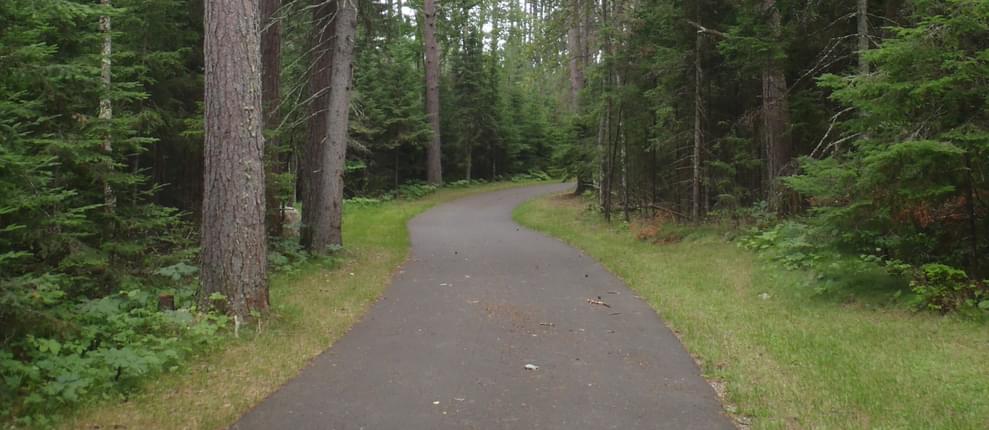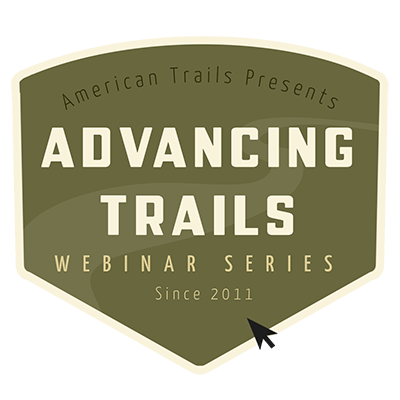




Subscribe to our mailing list for notifications on our latest trainings.

The goal of this webinar is to teach planners, landscape architects, engineers, and trail committee volunteers a variety of best practices for trail design. Hard surfaced trails are not as easy to design as they seem.
Presented by:
** This event has passed **
September 20, 2018
10:00 AM to 11:30 AM (Pacific Time) {more time zones}
Cost (RECORDING):
FREE for membersNote:
Closed Captioning is available for this webinar.
Learning Credits are available for this webinar.
This webinar is free. Would you consider a donation to support this webinar?
The goal of this webinar is to teach planners, landscape architects, engineers and trail committee volunteers a variety of best practices for trail design. Hard surfaced trails are not as easy to design as they seem. Details that can make trails safer, more user-friendly and more accessible are often overlooked. Cost overruns, project delays, permitting problems, construction “surprises” and maintenance headaches can often be avoided by employing better planning approaches & design techniques.
The presenter has distilled 20+ years of trail planning experience and added advice collected from a dozen trail designers and managers into a set of best practices on trail planning & design. You’ll view good and bad design examples on over 20 topics, such as: boardwalks, tunnels, trailheads, environmental planning, wetlands, accessibility details, wayfinding and more. Information will be presented in an easy-to understand, non-technical format with photos and drawings from around the U.S.
This webinar is designed for professionals who have a novice to intermediate level of trail planning or design experience. It focuses on new construction or rehabilitation of hard surface trails (asphalt, concrete, crushed stone, etc.) for bicycling, walking, ADA accessibility or multiple uses. However, many of the design techniques discussed also apply to natural surface trails.
Participants will be able to:
1. Avoid common trail development problems and delays by applying trail planning approaches and design techniques;
2. Distinguish between good and bad trail designs for several trail elements, including boardwalks, bridges, trailheads, wayfinding, road crossings, grading, alignment, culverts, etc.;
3. Apply tips and techniques during the planning, design, construction bidding and management stages of trails for a smoother development process, more user-friendly trail, and fewer maintenance headaches.
4. Access additional trail planning and design resources, to be provided on a resource list.
Holly Larson, Outdoor Recreation Planner, National Park Service

Holly Larson has been a trail planner since the early 1990's, and for the last 18 years has been an Outdoor Recreation Planner for the National Park Service's Rivers, Trails, and Conservation Assistance Program. In this position, she has assisted over 25 communities in Minnesota with planning and design for hard surface multi-use trails, collaborating with multiple trail user groups, and state, county and city engineers and trail managers. She worked for five years as a Trail Planner for the Maryland--National Capitol Planning Commission, where she was asked to fix really bad trail design mistakes, and to make bicyclists, hikers and equestrians get along. She started her trail planning career as a Monroe County Planner in the Florida Keys, when the first ISTEA legislation was passed. She and a colleague dreamed up a trail for the Keys and succeeded in obtaining funding for the first segments of what would become the Florida Keys Overseas Heritage Trail. She holds a Master’s Degree in Regional Planning from Cornell University.
We are offering closed captioning for our webinars, thanks to a partnership with VZP Digital. If you are in need of this service, please email us prior to the webinar. An unedited transcript will be sent to all attendees following the webinar.
American Trails is proud to be a certified provider of the following learning credits and continuing education opportunities:
Learning credits are free for attendees for American Trails webinars and the International Trails Symposium, as well as for other conferences, webinars, and workshops we offer credits for. Learn more here.
While we may individually agree (or disagree) in whole or in part with any or all of the participants, the views expressed in these webinars are not necessarily representative of the views of American Trails as an organization or its board and staff. Unless specific situations are noted by presenters, nothing in American Trails webinars should be considered to be interpreted as a standard.
By registering for our webinars, you submit your information to the webinar organizer and associated presenters and sponsors, who may use it to communicate with you regarding this event and their other services. Your organization may also be added to the American Trails Business Directory. You can easily cancel your registration at any time.
1,534 views • posted 06/12/2018
